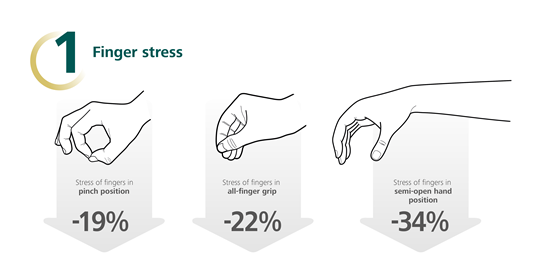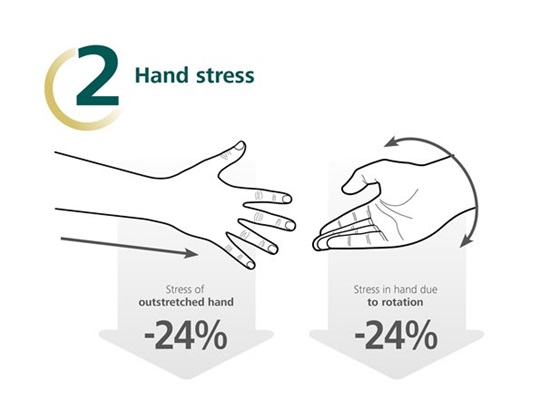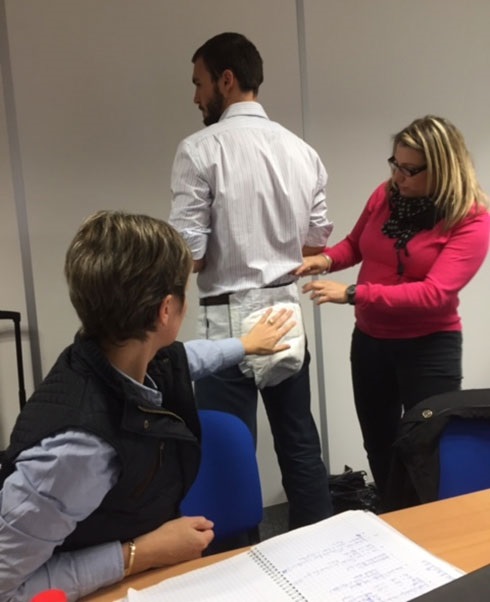Our approach to tackling healthcare challenges began with a committed partnership between our founder and a British surgeon in the 1800s. Today, this commitment has evolved into how we develop some of our greatest incontinence solutions.
Who cares for the caregivers?

“Caregivers forget simple gestures. They forget to raise the bed to the right level, or well position the patient to manipulate their tools in the right way,” a head nurse at Dijon University Hospital Centre in France said. “But this is because they don’t have the time. They repeat gestures that cause them pain.”
Christine Metz, director of marketing for HARTMANN Division of Hygiene in France, says the matter continues to receive national attention, reaching the ranks of the Minister of Health.
“Imagine you are in the hospital and there are caregivers missing due to sick leave,” said Christine. “How can you treat people when the staff are missing?”
A twenty-five-year veteran in the sector, Christine has had a front row seat to the changes impacting crucial roles across this field of care. And it is in France where the idea for a new product for caregivers arose.
Partnership first

October, 2015. Dijon University Hospital Centre. Dijon, France.
“We gave them a newly designed product and said, ‘go!’” said Christine, referring to more than 20 experienced caregivers who participated in first trials. “It was an immediate success.”
According to Christine, however, this wasn’t enough to prove better benefits, so the HARTMANN team needed to go further.
The next leg of testing included a significantly higher number of care givers. Also ergonomic experts were brought in to measure caregivers’ movements and the impact these movements had on their bodies.

Results of the testing showed:
- reduced stretch and stress of fingers in the “pinch position” by 34 percent;
- reduced stress of fingers in the “all finger grip” by 27 percent;

- reduced stress of “outstretched hand” and stress of hand “in rotation” by 24 percent; and
- reduced amount of time for applying the diaper by 20 percent (application in four steps instead of eight).
And, in 2016, MoliCare Elastic officially launched.
A partner in health

But for Christine, the solution was overdue.
“Back in 2014, when looking at what is now MoliCare Elastic, we asked: what can be done? How can we be more precise? What do caregivers, residents, and patients need? What could be the new solution for them?”
But Christine could not answer these questions alone. It was the collaboration between experts ranging from R&D to sales, to technical nurses and ergonomic experts. That made all the difference.
“We locked ourselves in a room. We looked at the current product and tore it apart. And believe me, we tried again, again, and again – with every trick and tool you can imagine,” said Christine. “We also had somebody play the role of the patient. We wanted to see if this was something that would be easy. Something that could really help our customers, but of course also our patients.”
Professional tool for use at home
Recent studies show that more than 30 percent of the population in 20 European countries were informal caregivers. Nearly eight percent were intensive caregivers (providing care for a minimum of 11 hours a week), with female and intensive caregivers reporting lower levels of mental well-being.
“If we can take away emotional stress from the caregiver then we’ve reached more than just having a new product,” said Head of HARTMANN´s Incontinence Division Irina Zhdanova. “We are able to offer a feeling of relief for the caretaker and the people supporting them – also at home. And this is worth working for every day with our partners.”
To fully experience the potential of MoliCare Elastic, Irina tested it on patients herself. It is one of the products she sees every day, when she looks at her little showroom on the wall in her office.
“Those under the care of loved ones deal with a common feeling: they do not want to be a burden on their loved ones, who support them,” said Irina. “For them, this also means a lot of emotional stress. Therefore, they are grateful when they know their caring relatives have solutions that make life easier for them. If we can play a role in making that possible, then we have gone just a bit further for health.”
2018 marks HARTMANN’s 200-year anniversary.
To commemorate this milestone, we have put together this series of articles. In it we show how our employees and partners contribute to advancing healthcare, as well as discussing trends and issues that affect the healthcare systems we serve.
